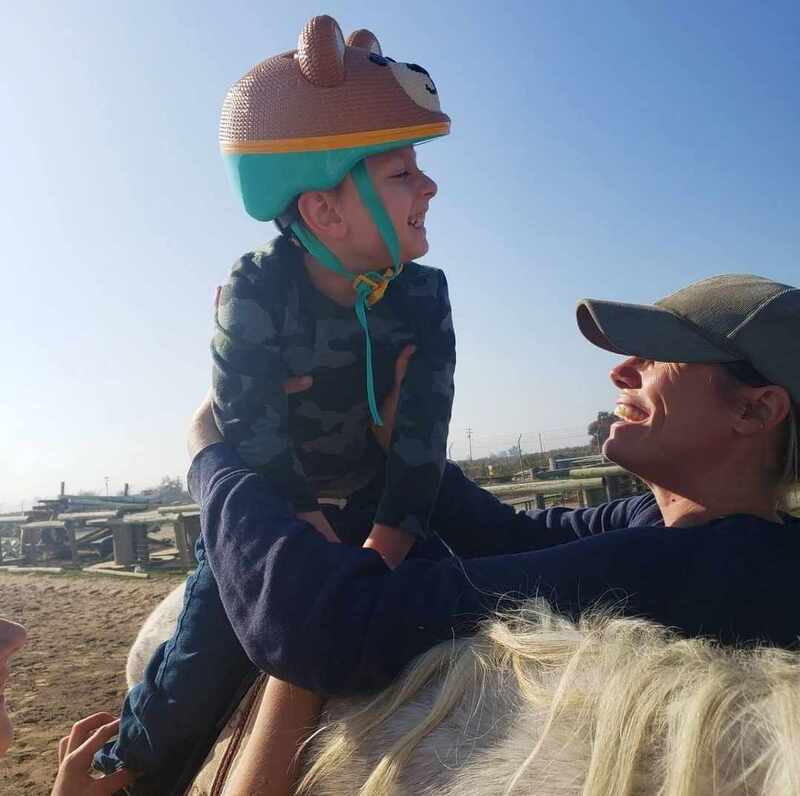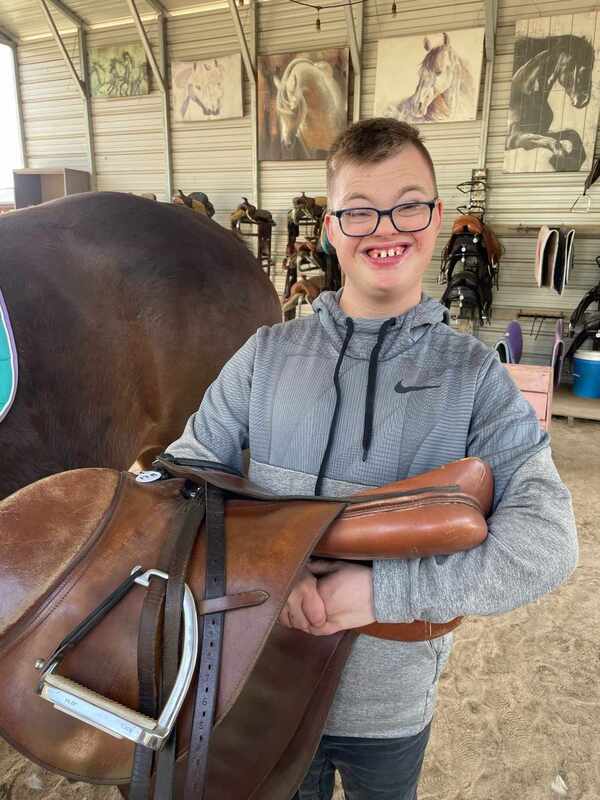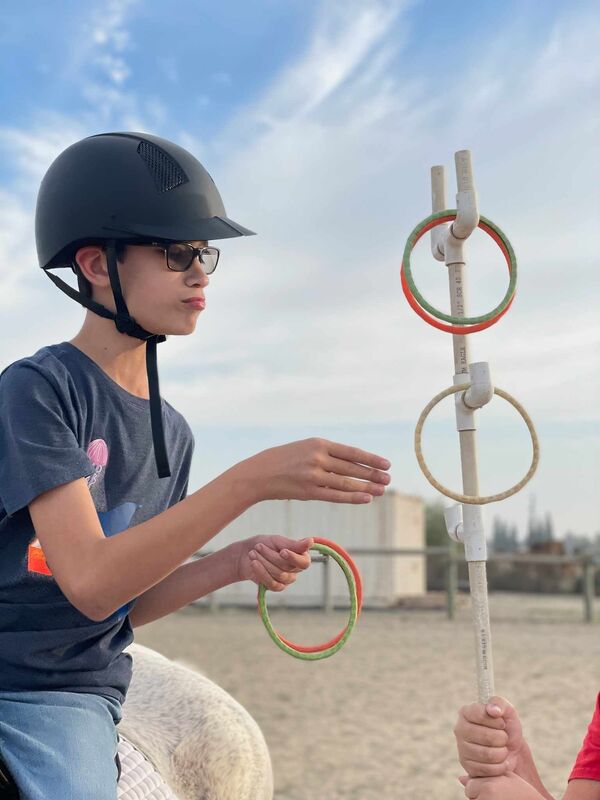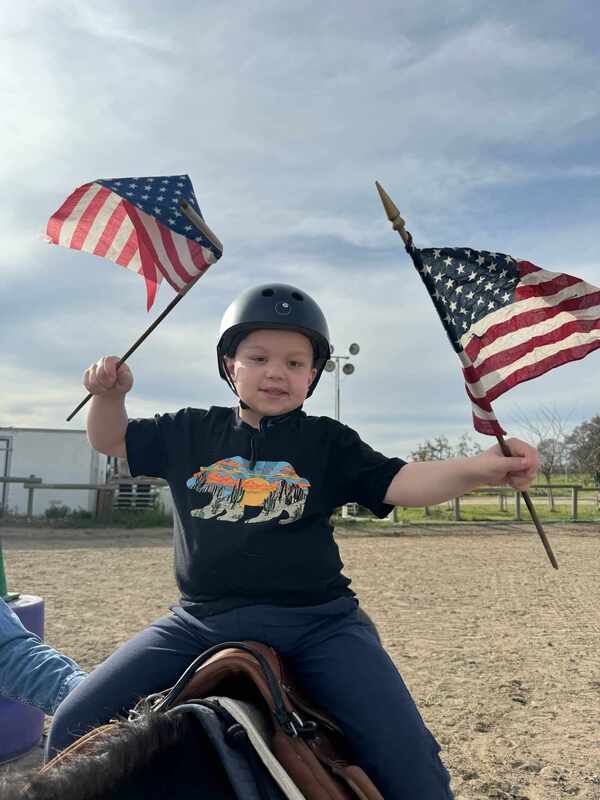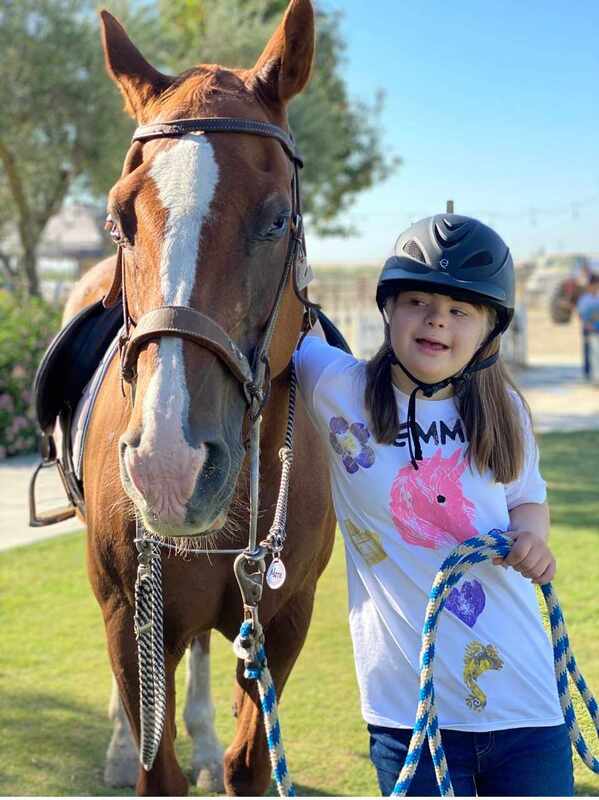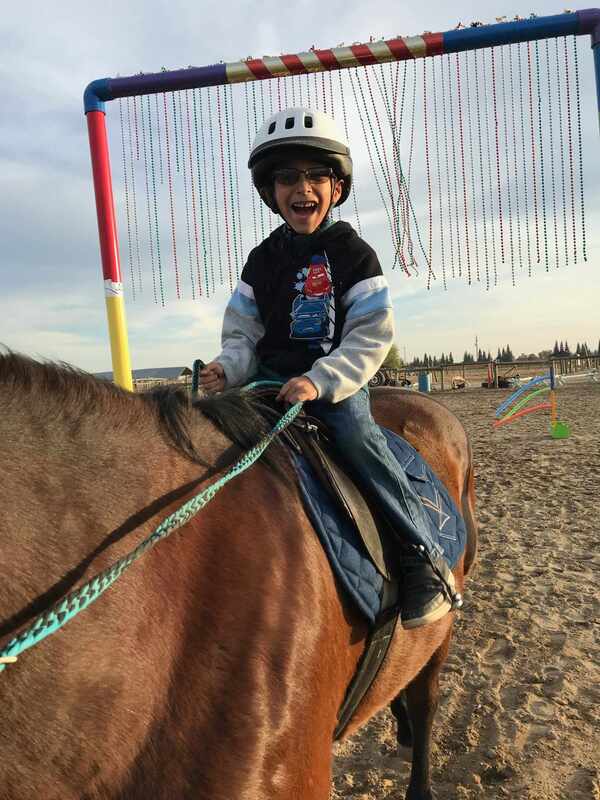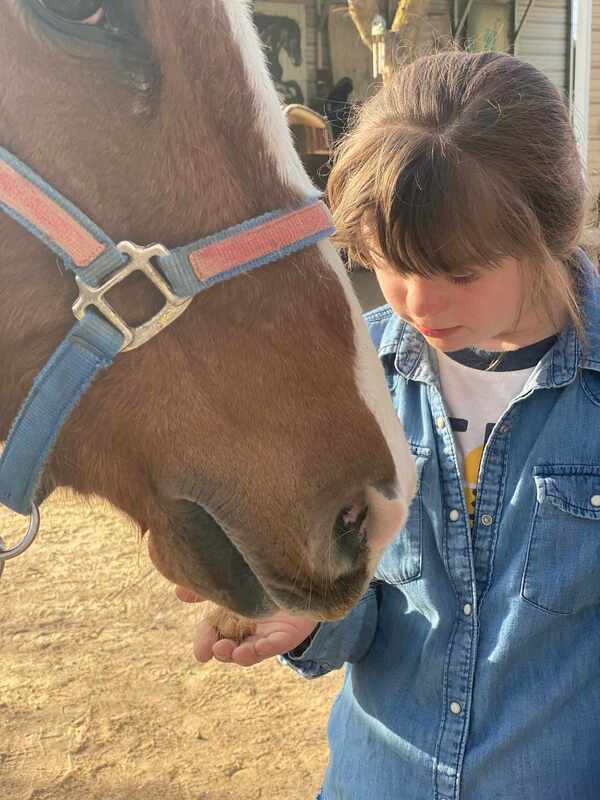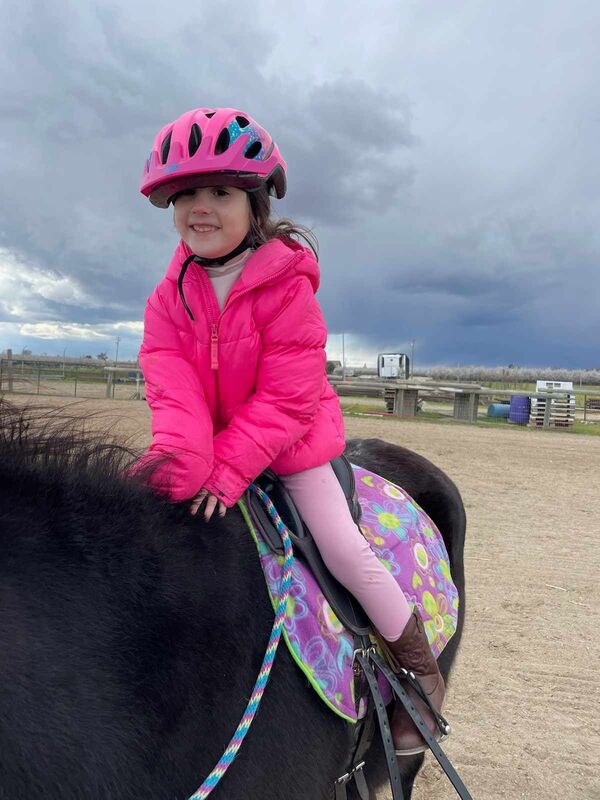Therapeutic Riding Programs
SpiritHorse Riding Curriculum:
While we teach riding, the principal goal of our program is therapy. Our horses have been carefully selected based on their gentleness, level of training, and ongoing display of love for their work. Learn more about our horses on the OUR HORSES tab.
Our riders work through a 97-step program that is tailored to specific disabilities. Intervention is provided in a one-on-one setting and group settings with parent or guardian involvement. Riders as young as two-years-old with disabilities lead their ponies independently. If the children are in their parents arms, we place the lead rope in their hands and they lead their pony. We work to develop greater ability in each of our riders, and there is rider participation no matter how involved the rider's disability may be.
Each session begins with grooming and tacking up, leading the horse/pony, mounting, riding, and then ends with leading the horse/pony back to the barn, unsaddling, grooming, and rewarding the horse/pony with a treat (often the favorite part of the session for horse and rider!). Our horses and ponies can be led from wheelchairs, walkers, and canes. Through this process riders also learn skills such as following instructions, focus, task sequence, participation, independence and they gain self confidence.
Those with cognitive disabilities learn sequencing, two-step task execution, following instructions, and work/reward. They also develop a stronger bond with their horse. This process develops empathy which is especially important with our riders diagnosed with autism. The horses learn to love the children, which is evident in their gentleness. Many of our riders look forward to this element as much as they do their riding lesson.
The riding portion of the lesson starts with a trail ride, lead by the instructor and protected by side walkers. As the lesson progresses and the rider begins developing balance, we provide exercises and riding development in a very small ring called a round pen, in which the horse is controlled by the instructor using a rope called a lunge line. Over time, when the rider develops sufficient balance, we begin to have the side walker step aside in the round pen so that the rider will develop stronger balance, and with this development, safe riding skills.
With safety being paramount, we use methods and steps designed to develop the rider's balance and horsemanship skills. It is our goal to eventually have each of our riders to be independent, under controlled conditions.
If you are interested in this, or any of our programs, please CONTACT us.
If you would like to partner with us and sponsor a rider, please click on the GIVE tab or donate at the bottom of this page.
While we teach riding, the principal goal of our program is therapy. Our horses have been carefully selected based on their gentleness, level of training, and ongoing display of love for their work. Learn more about our horses on the OUR HORSES tab.
Our riders work through a 97-step program that is tailored to specific disabilities. Intervention is provided in a one-on-one setting and group settings with parent or guardian involvement. Riders as young as two-years-old with disabilities lead their ponies independently. If the children are in their parents arms, we place the lead rope in their hands and they lead their pony. We work to develop greater ability in each of our riders, and there is rider participation no matter how involved the rider's disability may be.
Each session begins with grooming and tacking up, leading the horse/pony, mounting, riding, and then ends with leading the horse/pony back to the barn, unsaddling, grooming, and rewarding the horse/pony with a treat (often the favorite part of the session for horse and rider!). Our horses and ponies can be led from wheelchairs, walkers, and canes. Through this process riders also learn skills such as following instructions, focus, task sequence, participation, independence and they gain self confidence.
Those with cognitive disabilities learn sequencing, two-step task execution, following instructions, and work/reward. They also develop a stronger bond with their horse. This process develops empathy which is especially important with our riders diagnosed with autism. The horses learn to love the children, which is evident in their gentleness. Many of our riders look forward to this element as much as they do their riding lesson.
The riding portion of the lesson starts with a trail ride, lead by the instructor and protected by side walkers. As the lesson progresses and the rider begins developing balance, we provide exercises and riding development in a very small ring called a round pen, in which the horse is controlled by the instructor using a rope called a lunge line. Over time, when the rider develops sufficient balance, we begin to have the side walker step aside in the round pen so that the rider will develop stronger balance, and with this development, safe riding skills.
With safety being paramount, we use methods and steps designed to develop the rider's balance and horsemanship skills. It is our goal to eventually have each of our riders to be independent, under controlled conditions.
If you are interested in this, or any of our programs, please CONTACT us.
If you would like to partner with us and sponsor a rider, please click on the GIVE tab or donate at the bottom of this page.
Riding programs for victims of abuse and victims of domestic violence:
We provide horseback riding lessons with one-on-one mentors to children who are victims of abuse and women who are victims of domestic violence, which promote internal healing, trust, and improved mental health. The relationship developed between rider and horse builds trust and self confidence.
Activities are monitored and progress recorded by the SpiritHorse Connections staff. Meetings are held between mentors and staff to evaluate client progress and individual lesson plan adjustments are made as necessary to meet group and individual goals.
We provide horseback riding lessons with one-on-one mentors to children who are victims of abuse and women who are victims of domestic violence, which promote internal healing, trust, and improved mental health. The relationship developed between rider and horse builds trust and self confidence.
Activities are monitored and progress recorded by the SpiritHorse Connections staff. Meetings are held between mentors and staff to evaluate client progress and individual lesson plan adjustments are made as necessary to meet group and individual goals.
At-Risk Youth Program
Our At-Risk-Youth and Youth After Drug Rehab programs consist of weekly barn management and horseback riding lessons for youth in alternative education programs that include one hour of the school day as an incentive. The program can also be made available outside of school hours. Participants provide community service for one hour each week to earn weekly lessons. Through volunteer activities, they learn to embrace the work/reward ethic. Horses and the ranch atmosphere can be greatly incentivizing. Horses accept us on a non-judgmental basis and teach us to be open, trusting, cooperative, and appreciative.
What is required to participate in this program?
Program participants must meet behavioral and academic application objectives set by their school's alternative education program each week in order to participate if they will be participating during school hours. Additionally, they must provide one hour of community service at SpiritHorse Connections Therapeutic Riding Center. This work includes cleaning stalls and equipment, grooming horses, assisting in medication and horse hygiene activities, assisting in horse shoeing and trimming, and grounds maintenance.
If you are interested in this, or any of our programs, please contact us.
Our At-Risk-Youth and Youth After Drug Rehab programs consist of weekly barn management and horseback riding lessons for youth in alternative education programs that include one hour of the school day as an incentive. The program can also be made available outside of school hours. Participants provide community service for one hour each week to earn weekly lessons. Through volunteer activities, they learn to embrace the work/reward ethic. Horses and the ranch atmosphere can be greatly incentivizing. Horses accept us on a non-judgmental basis and teach us to be open, trusting, cooperative, and appreciative.
What is required to participate in this program?
Program participants must meet behavioral and academic application objectives set by their school's alternative education program each week in order to participate if they will be participating during school hours. Additionally, they must provide one hour of community service at SpiritHorse Connections Therapeutic Riding Center. This work includes cleaning stalls and equipment, grooming horses, assisting in medication and horse hygiene activities, assisting in horse shoeing and trimming, and grounds maintenance.
If you are interested in this, or any of our programs, please contact us.
Riding Lessons for the General Public
Beginner to advanced riding lessons are available in the English and Western riding disciplines. We have over 40 years of lesson and training experience. Providing riding lessons to the general public is one way we support our therapy programs and horses. The riders will be learning to ride AND supporting individuals in our community!
If you are interested in this, or any of our programs, please contact us.
If you are interested in partnering with us to sponsor a rider, please donate below or click on the GIVE tab.
If you are interested in this, or any of our programs, please contact us.
If you are interested in partnering with us to sponsor a rider, please donate below or click on the GIVE tab.
